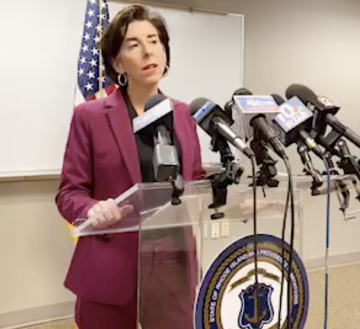UPDATED: Raimondo Declares State of Emergency to Combat Coronavirus
Tuesday, March 10, 2020
Governor Gina Raimondo has declared a state of emergency in Rhode Island.
Raimondo has announced a series of emergency regulations to assist employers and displaced or impacted workers.
GET THE LATEST BREAKING NEWS HERE -- SIGN UP FOR GOLOCAL FREE DAILY EBLAST"I’m also calling on President Trump to declare a federal disaster and provide additional relief to anyone out of work," said Raimondo.
"This isn’t a time for panic — the risk for the average Rhode Islander remains low — but it is time for action," she said.
The declaration allows the State to access additional resources to supplement its robust response to COVID-19. In addition, today the Governor, Rhode Island Department of Labor and Training (DLT), and Rhode Island Department of Health (RIDOH) announced a series of new COVID-19 preparedness and response measures to support employers, employees, and nursing homes throughout the state.
DLT is filing an emergency regulation to expand access to the Unemployment Insurance (UI) and Temporary Disability Insurance (TDI)/Temporary Caregiver Insurance (TCI) programs to better serve Rhode Islanders impacted by COVID-19. The emergency regulations will:
Waive the seven-day waiting period for regular unemployment insurance claims and claims filed under the short-term compensation program (WorkShare).
Waive the seven-day minimum amount of time that claimants must be out of work to qualify for TDI/TCI benefits.
Waive the required medical certification for individuals under quarantine (and allow them, instead, to temporarily qualify via self-attestation that they were under quarantine as a result of COVID-19).
Nursing homes are now:
Limiting when visitors can enter,
Not admitting visitors who are younger than 18 years of age,
Only allowing residents to leave for medical appointments, and
Actively screening visitors, staff, vendors, entertainers, and anyone else who enters for illness and recent travel history. (People who are ill or have traveled internationally in the last 14 days will not be allowed to visit.)
In special circumstances, exceptions can be made from this policy, given the importance of mental and emotional health to the overall wellness of older adults. Families should work with nursing home administrators regarding special circumstances. RIDOH is partnering with Rhode Island’s Long-Term Care Ombudsman, Kathy Heren, in supporting nursing homes.
"There are still 3 confirmed cases — 53 people tested negative — and tests pending for 6 people," said Alexander Scott. "There are currently 290 people are self-quarantining."
"We have to take steps now to prevent the spread of COVID-19 -- with a particular focus on the elderly," she said.
"People who are older than 60 years of age should refrain from close contact with people who are sick -- and they should pay attention to potential COVID-19 symptoms -- fever, coughing, shortness of breath," she said.
"The goal is to keep sick people out of nursing homes. They are limiting when visitors can enter facilities, allow residents to leave for necessary medical visits and actively screening visitors for illness," said Alexander Scott.
"[This has to be] someone stationed at the entrance and asking questions of anyone coming in the door," she said, adding that nursing homes that could not comply would have to close the facility to visitors until a plan is put in place.
She added that exceptions can be made in extenuating circumstances.
This story was first published 3/9/20 4:55 PM
Related Articles
- UPDATED: 200 in RI Are Now Self-Quarantined As Coronavirus Exposures More Than Quadrupled
- RI Fire Captain Criticizes State for Lack of Information Regarding Potential Coronavirus Exposure
- NEW: 3rd Case of Coronavirus Identified in MA
- New Coronavirus Developments and Concerns in Rhode Island and Beyond
- RI House Chair to RIDE: Come Up with Remote Learning Protocols in Light of Coronavirus
- BBB Warns of Coronavirus Face Mask Scam
- Brown University’s Dr. Chan Warns of Depleting Masks Needed for Coronavirus
- RI Hit with Multiple Cases of Coronavirus, 38 Being Monitored, Unknown Number May Have Been Exposed
- BREAKING: Coronavirus Expands - Massachusetts Reports New Case
- UPDATED: Coronavirus Test Results Delayed for Achievement First Staffer - Schools to Remain Closed
- BREAKING: East Greenwich School is Shut Down Over Potential Coronavirus Exposure Tied to Travel
- NEW: St. Ray’s Drops Out of High School Playoffs Due to Coronavirus Concerns in RI
- BREAKING: 5 New Cases of Coronavirus in MA, Total Jumps from 1 to 8 in a Week
- Do RI Students Have What They Need to Wash Their Hands in Schools to Fight Coronavirus?
- Launching Monday: Coronavirus Updates Daily with Dr. Michael Fine on GoLocal LIVE at 12 noon
- Venture Café Events at Wexford Are Cancelled — Will Offer Virtual Events in Wake of Coronavirus
- NEW: Visitation Suspended at Lifespan Hospitals Due to Coronavirus
- RI General Assembly Allowing Written Testimony on All Bills Due to Coronavirus Concerns
- Rickman’s Big View - Response to Coronavirus
- BREAKING: Coronavirus Cases More than Double in MA in 24 Hours — 28 Cases
- UPDATED: Third Case of Coronavirus in RI Identified, Woman Works at Nursery School
- Bryant University Women’s Summit 2020 Postponed Due to Coronavirus Concerns
- MA Coronavirus Cases Jump to 13 — Five New Cases Identified
- In RI, Coronavirus Impacting Fundraisers, Business Meetings and Sporting Events



